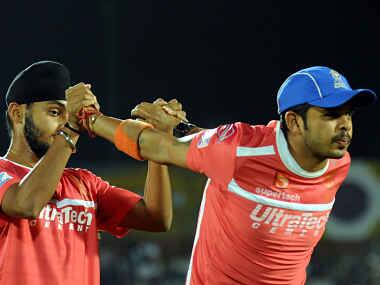Given the reports that have come thick and fast about the police’s investigation into the alleged spot-fixing racket in the IPL, it would appear that the case against the three Rajasthan Royals players is a slam dunk. But it won’t be so easy to prove criminal liability in a court of law where the prosecution will need to convince a judge beyond a reasonable doubt, say lawyers. “It is going to be very, very difficult,” Desh Gaurav Sekhri, a sports lawyer, told Firstpost. The first issue is who is going to serve as the complainant. It is for this reason that the Rajasthan Royals have been asked to file an FIR. “It is pretty clear they are the only ones who have a case against the players,” Sekhri said. [caption id=“attachment_801233” align=“alignleft” width=“380”]  Sreesanth is one of three players who have been arrested. BCCI[/caption] Sreesanth, Ankeet Chavan and Ajit Chandila are the three players who were arrested by the Delhi Police earlier this month, allegedly for agreeing to spot-fix for money. All three played for the Rajasthan Royals. The Royals can sue for breach of contract but that doesn’t necessarily amount to criminal charges, the lawyers said. The players have been booked under sections 420 and 120 (b) of the Indian Penal Code and charged with cheating, but the central question that will need to be answered is: who exactly have they cheated? The players can’t be charged under the Public Gambling Act either because they have not gambled, Sekhri said. While there have been reports that at least one of the players has confessed, the confessions are not admissible as evidence in court since they were made without a judge or an attorney being present. The only condition under which such confessions can be admissible are if they lead to recovery of further evidence, Rahul Mehra, an activist lawyer who has fought a number of cases against sports bodies in India, including the BCCI, said. But even then, it is only the part of the confession that leads to the recovery that becomes admissible. The rest still has to be discarded. The precedent of the 2000 match-fixing investigation also hovers in the background. In that case the police were unable to produce enough evidence that would have been admissible in court, despite extensive documentation of conversations between players and fixers. However, Mehra feels the police have learned their lessons from that investigation. The Evidence Act has also been updated to allow for electronic evidence and the Delhi Police have claimed they have recovered BBM and Whatsapp messages that show collusion between the players and bookies, which would then strengthen the case. The Mumbai police have also said they are considering charges under the Maharashtra Control of Organised Crime Act because of the potential links to the Mumbai underworld, but Sekhri thinks this is a long shot. “It will need to be proved that there was some threat to the nation or that fixing in the IPL is against the national interest.” It is also very difficult to prove intent e.g. Herschelle Gibbs, the former South Africa batsman, admitted to taking money from a bookie but then did not under perform in the match. For Sekhri, the police would need to have “video evidence of meetings or a conversation where player agrees to a bookie’s demands for cash”. Mehra is a little more optimistic, believing that if the investigation is conducted fairly and allowed to proceed to its logical conclusion, then there is a likelihood of a conviction. But whether or not the players will get any jail time would still be uncertain. “If it becomes a media trial or the judge wants to make an example of the players [then it is possible],” Mehra said.
While there have been reports that at least one of the players has confessed, the confessions are not admissible as evidence in court since they were made without a judge or an attorney being present.
Advertisement
End of Article
Written by Tariq Engineer
Tariq Engineer is a sports tragic who willingly forgoes sleep for the pleasure of watching live events around the globe on television. His dream is to attend all four tennis Grand Slams and all four golf Grand Slams in the same year, though he is prepared to settle for Wimbledon and the Masters. see more


)
)
)
)
)
)
)
)
)



